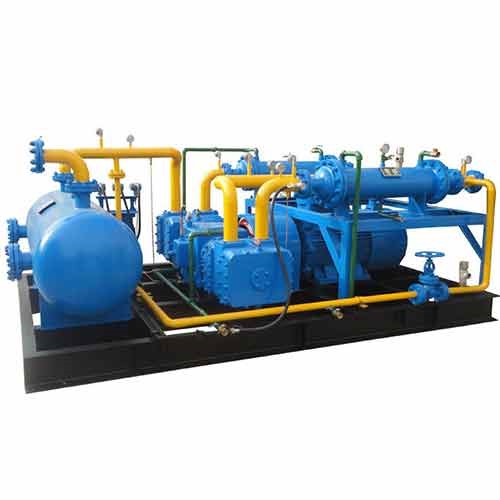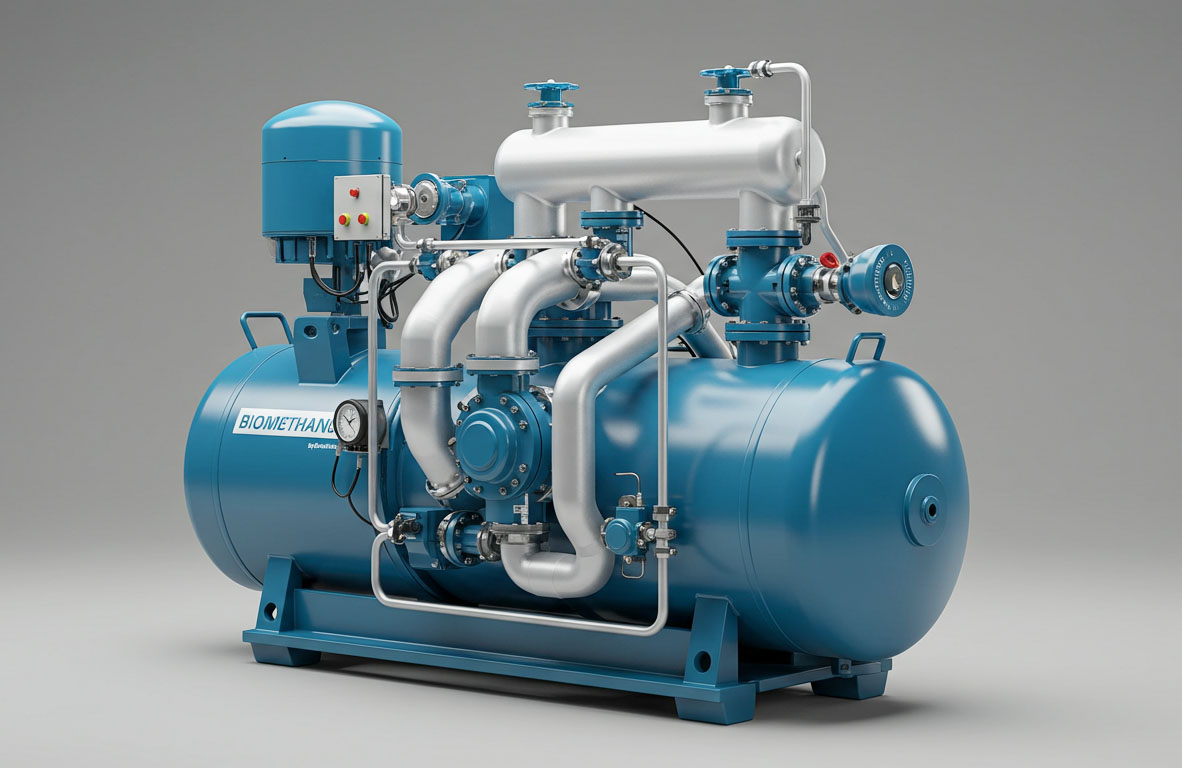Biogas Compressor: Enhancing Sustainability

In the ever-evolving landscape of renewable energy sources, biogas compressor has emerged as a promising and environmentally friendly option. Derived from organic matter, biogas offers a sustainable alternative to conventional fossil fuels. Its importance in reducing greenhouse gas emissions and promoting sustainable energy production cannot be overstated. However, harnessing the full potential of biogas requires the use of specialized equipment, such as biogas compressors. In this comprehensive guide, we will delve into the world of biogas compressors, exploring their role in enhancing sustainability in energy production.
What is a Biogas Compressor?
A biogas compressor is a critical component in the biogas industry, designed to increase the pressure of biogas for various applications. At its core, a biogas compressor takes raw biogas, which typically has a low pressure, and compresses it to higher pressures suitable for utilization in a range of industrial processes and power generation. This compression process is essential for maximizing the energy content of biogas and making it more versatile.
The fundamental principle behind biogas compression is the reduction of gas volume while simultaneously increasing its pressure. This results in a more energy-dense and transportable form of biogas, making it easier to store, transport, and utilize in diverse applications.
Benefits of Biogas Compression
The use of biogas compressors offers a multitude of benefits, making them indispensable in sustainable energy production:
- Improved Energy Efficiency: Biogas compression enhances the energy density of biogas, making it more efficient for various applications. This leads to better energy utilization and reduced waste.
- Energy Storage: Compressed biogas can be stored more conveniently, allowing for reliable energy supply during peak demand or when biogas production is intermittent.
- Reduced Greenhouse Gas Emissions: By optimizing biogas utilization, biogas compressors contribute to lower greenhouse gas emissions compared to fossil fuels.
- Increased Versatility: Compressed biogas can be used in a wide range of applications, including electricity generation, heating, and transportation fuels.
In addition to the advantages mentioned above, biogas compression has significant environmental and economic benefits:
- Waste Reduction: Biogas is often produced from organic waste materials, providing an eco-friendly solution for waste disposal.
- Cost Savings: Utilizing biogas as a renewable energy source can lead to substantial cost savings compared to traditional fossil fuels.
- Renewable Resource: Biogas is a sustainable and renewable resource, reducing reliance on finite fossil fuel reserves.
Types of Biogas Compressors
Reciprocating compressors are one of the most common types of biogas compressors. They operate by using pistons to compress the gas. These compressors are known for their reliability and ability to handle varying flow rates and pressures. They are often used in small to medium-scale biogas projects.
Rotary screw compressors, on the other hand, use rotating screws to compress biogas. They are highly efficient and suitable for large-scale biogas applications. Rotary screw compressors are known for their continuous operation and can handle high volumes of biogas.
Each type of biogas compressor has its unique features and applications, and the choice between them depends on factors like the scale of natural gas production and specific project requirements.
Applications of Biogas Compressors
Wastewater treatment plants are one of the primary users of biogas compression technology. They generate biogas as a byproduct of treating sewage and organic waste. Biogas compressors are crucial here to increase the pressure of the biogas for use in heating, electricity generation, or injection into natural gas pipelines.
Agricultural operations, such as farms and livestock facilities, can benefit from biogas compression technology. They produce biogas from animal manure and crop residues. Compressed biogas can be used to power farm equipment, provide heating, and reduce energy costs.
Considerations for Choosing a Biogas Compressor
Selecting the right biogas compressor is crucial to ensure efficient and reliable biogas utilization. Consider the following factors when making your choice:
- Capacity: Determine the volume of biogas that needs to be compressed, as this will impact the compressor size and capacity.
- Pressure Requirements: Different applications require varying levels of compressed biogas pressure. Ensure the compressor can meet these requirements.
- Energy Efficiency: Choose a compressor with good energy efficiency to minimize operational costs.
- Maintenance Needs: Consider the maintenance requirements of the compressor and ensure it aligns with your available resources.
- Compatibility: Ensure that the chosen compressor is compatible with the type of biogas produced and the intended applications.
Maintenance and Care of Biogas Compressors
Regular maintenance is essential to keep biogas compressors in optimal working condition. Maintenance tasks may include:
- Lubrication: Proper lubrication of moving parts to reduce friction and wear.
- Cleaning: Keeping the compressor clean and free from debris and contaminants.
- Inspection: Regular inspections to identify and address any issues before they escalate.
- Component Replacement: Replacing worn or damaged components as needed.
- Safety Checks: Ensuring safety features are functioning correctly.
A well-maintained biogas compressor will operate efficiently and have a longer lifespan, ultimately contributing to cost savings and sustainability.
Safety Measures in Biogas Compression
Safety is paramount when dealing with biogas compression. Adequate ventilation is crucial to prevent the accumulation of potentially harmful gases. Gas detection systems should be in place to monitor gas levels and trigger alarms if unsafe conditions arise.
Having well-defined emergency procedures is essential. Personnel should be trained to respond to emergencies such as gas leaks or equipment malfunctions swiftly and effectively.
Proper training of operators and personnel involved in biogas compression is essential to ensure safe operation. Awareness of potential hazards and the importance of following safety protocols cannot be understated.
Future Trends in Biogas Compression Technology
The biogas compression industry is evolving, with the integration of smart monitoring systems. These systems use sensors and data analytics to optimize compressor performance, reduce energy consumption, and predict maintenance needs, ultimately improving efficiency and reliability.
Ongoing research and development efforts are focused on enhancing the efficiency of biogas compressors. This includes the development of more efficient compression methods and materials, reducing energy consumption and operating costs.
Biogas compression technology is increasingly being coupled with energy storage solutions, such as advanced batteries or gas storage systems. This allows for better integration of biogas into the overall energy grid and provides reliable energy supply during peak demand.
The adoption of these advancements in biogas compression technology has the potential to revolutionize the biogas industry, making it an even more attractive and sustainable energy source.
Conclusion
In conclusion, biogas compressors play a pivotal role in enhancing sustainability in energy production. By increasing the energy density of biogas, these compressors make it more versatile and environmentally friendly. Their applications span across various industries, from wastewater treatment plants to agricultural operations.
When choosing a biogas compressor, it’s essential to consider factors like capacity, pressure requirements, and energy efficiency. Regular maintenance and strict safety measures are crucial to ensure safe and efficient operation.
As technology continues to advance, the future of biogas compression holds promise with smart monitoring systems, improved efficiency, and integrated energy storage solutions. It is imperative that we embrace these innovations and continue to explore biogas compression technology for a greener and more sustainable future. By harnessing the potential of biogas and its compressors, we can contribute to a cleaner and more sustainable energy landscape.


